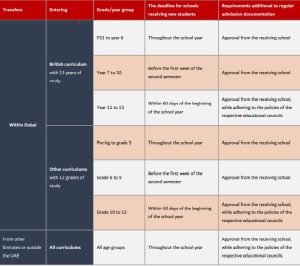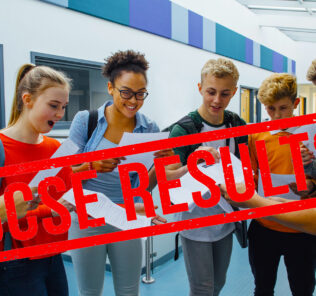Changing your child’s school in Dubai is never a decision to be taken lightly. In a transient expat environment, a child’s place of education often forms the bedrock of their sense of stability, so moving from one to another requires careful thought. Deciding to transfer schools in the UAE during the course of the academic year can potentially be even more disruptive, considering that curricula modules are studied at different paces and friendship circles may already be set.
But there are plenty of solid reasons why parents choose to switch their children’s school mid-year in the UAE. From the changing circumstances of expat life, to the temptation of new educational opportunities, or dissatisfaction with a current school, all are valid reasons and all can be the catalyst for a positive change and exciting new beginning.
“Changing schools has been the best thing I ever did for my son,” says Shelly Rosa, a Dubai-based mum who transferred her eight-year-old from one Dubai primary school to another after the 2021/22 Winter Break:
“I was so unhappy with my son’s previous school’s communication and how they handled online learning over COVID. It’s sad because it caused a lot of stress for my son. But now his new school is like a second home. He comes out every day full of smiles and beaming with joy. His education is blossoming and the staff and the whole school are all amazing.”
Here we look at when, why and how to transfer school mid-year in the UAE…
When to switch your child’s school in Dubai
One upside for those considering changing their child’s school mid-year in the UAE is that in-year admission (as it’s known) is far more common here than it is in non-expat environments. “We have a natural turnover of students throughout the year,” says Zara Harrington, Principal of Safa British School in Dubai:
“A child’s home country can affect when during the course of the year they start with us. As a British-curriculum school our academic year runs from September to August, whereas other curricula run from April to April, or from January to December. So the most common reason for a mid-year starter at our school is a child changing curriculum and country.”
“It is reasonably common for us to have students joins us during the course of the academic year,” agrees Daniel McHugh, Head of Secondary at Al Ain Aldar Academy in Abu Dhabi: “We often have parents enquiring due to having heard positive reviews from their friends and family. Changing schools is an important decision, so few parents contact us definitely wanting to make the move; they want information, advice and reassurance.”
For online schools such as Minerva’s Virtual Academy, in-year admission is even more usual, and almost all timings can be accommodated: “It is very common for us to receive new pupils in the middle of the academic year,” says Lawrence Tubb, Headmaster of Minerva’s Virtual Academy, which offers a British Curriculum.
“A high proportion of our pupils join during the course of the academic year – most often at the start of a term (for instance, we have a large January intake each year) but we also accept new pupils at fortnightly intervals throughout the year.”
The main challenge, in any year group, is catching up on any modules of work that they might not have covered in their previous school and that might need to be studied as the foundation for further study, adds Tubb:
“This is why we give pupils support in this, with access to all of the modules, live lesson recordings, and the detailed support and guidance of their mentor. Different exam boards can focus on different topics, so it is best to make any change of school within the GCSE or A-level years as early as possible at the beginning of the exam course (Year 10 for GCSEs or Year 12 for A-levels) to minimize the potential disruption.”
While there are pros and cons to switching schools at any time, none of these is insurmountable, says Daniel Mchugh Head of Secondary at Al Ain Academy:
“We believe that a student can start any week of the term and have systems in place to help them with a successful transfer.”
When students can transfer schools in the UAE by age and curriculum
There are some restrictions on exactly when students can transfer schools within the UAE, depending on their year and the curriculum being studied. Sin contrast, students transferring from a country outside the emirates to a UAE school may be admitted at any time.
The following table from the Dubai school regulator, the Knowledge and Human Development Authority (KHDA), explains when in the academic year students at different ages can transfer schools, and any additional documentation that is required:
Why transfer schools in the UAE?
Moving countries due to a parent’s job is the most common reason that experts come across for children changing schools. But there are many other reasons why children might switch schools mid-year too. Prathna Singh, Child and Adolescent Clinical Psychologist at Vivamus Dubai explains:
“Occasionally, parents talk to me about wanting to move their child to a different school midway through the academic year. This decision usually arises due to reasons that are beyond the family’s control – such as when a family needs to re-locate suddenly due to a parent’s new job opportunity, or when some other unexpected life event requiring re-location happens.
“In some rarer instances, switching schools may be due to a child having lots of difficulty in a school despite several attempts to help them adapt and cope there.
“If the family is considering moving a child because he/she is very unhappy, it is usually recommended that parents explore all avenues of support about how their child’s experience can be improved in the current school before considering moving a child to a different school.
“If it is absolutely necessary to move, it would be ideal for this to occur at the beginning of a new school year rather than midway through, because getting used to changes mid-year might be more overwhelming.”
Daniel Mchugh Head of Secondary at Al Ain Academy, says he sees a mixture of reasons for children transferring schools within the academic year, and all of them can result in a successful transition:
“The main reasons we seem to have students join us mid-year are due to our reputation, though sadly I do still hear heart-breaking stories about students not ‘fitting in’ where they are.”
Dissatisfaction with a current school – whether that’s due to something technical like the curriculum or approach to homework, or something very serious like unresolved bullying – is just one of the many reasons that families choose to move their children to an online school, says Minerva’s Academy Headmaster Lawrence Tubb:
“Families join us for many reasons, including: pupil being bored or fed up with the routine of mainstream physical school; families wanting to be more in control of their education and gain their essential qualifications as part of a global learning community, from the comfort and safety of home; pupils who have experienced bullying and don’t feel safe at mainstream physical school, which impacts negatively on their ability to learn; pupils for whom the traditional physical classroom model does not enable them to learn effectively – for example, those suffering with severe anxiety and other mental health difficulties, or those with certain special educational needs; pupils who have a lifestyle that doesn’t lend itself to the structures and schedules of mainstream physical school – for example, talented sportspeople and performers or those with internationally mobile families; and, sadly, pupils who have experienced a significant disruption to their learning, for whom mainstream physical school is too daunting a prospect, who need to access education urgently.”
Read our deep dive into all of the possible reasons to transfer schools in the UAE.
Challenges to consider before transferring schools in the UAE
Switching schools mid-year can be a major adjustment for children emotionally as well as academically, says Prathna Singh, Child and Adolescent Clinical Psychologist at Vivamus Dubai:
“If a mid-year change is imminent and unavoidable, it is important for parents to carefully prepare, so their child can feel equipped and supported during the transition. Children have to make new friends, get to know new teachers and adapt to a different setting or even different curriculum, all in a new environment where things might be done very differently to what they are used to.
“This adjustment can be especially difficult for pre-teenagers or teenagers, who have already established longer friendships. Sometimes children can also feel very pressured because they have the added challenge of having to adjust to a new setting whilst meeting the same deadlines as their peers who have already had enough time to settle into and get used to the school environment.”
If you are considering a move, speak to more than one school to get a feel for the options available to you, advises Daniel McHugh of Al Ain Academy. “Never discount having your child remaining where they are until the end of the year, as a fully informed and deliberated decision needs this option to be considered.”
It’s also important to be realistic about the move, says McHugh. “Don’t feel that a change of school is a panacea, a ‘magic pill’ that resolves any concerns that you have, and be honest with everyone you speak with.”
Switching schools in order to pay lower fees is a common occurrence, but “try to think more broadly about value-for-money,” says McHugh. “There’s always a reason for low fees, so consider if you are OK with those reasons.”
Crucially, engage with your child, even if they are reasonably young, he says: “Don’t do it without them understanding what is happening and why.”
How schools can help children settle into a new school mid-year
Friendships and pastoral success is the key focus when helping a transfer student settle in to Safa British School (SBS), says Principal Zara Harrington:
“Starting a new school at any point of the year is daunting for both student and parent. A new drop off and pick up routine, new systems to learn for the parents and the students have so many new faces and names to learn. Here at SBS they have a buddy to help orientate into the new environment, followed by a pastoral check in and a meeting between teacher and parents after 2 weeks to see how everyone has settled to life at SBS.”
Al Ain Academy also has a buddy system, says Daniel Mchugh, Head of Secondary:
“If students have left a closely-knit friendship group, that can be very upsetting for them. Our welcome process and buddy system aims to help students who may be anxious or upset. “Students will receive their timetable and information about their classes long before they arrive, and they will have been added to our class Teams on Microsoft almost as soon as their parents accept our offer of a place.
“Our teachers and the students’ pastoral tutor are regularly in touch with the student in the run-up to their first day, and on Day 1 our senior leadership team make a point of meeting every new student, and their parents, at Reception for a welcome and chat. Once they get to their homeroom or tutor room, they are buddied up with two of our class ambassadors, who will show them the ropes and help reassure them.”
At Minerva’s Virtual Academy, students are linked up with a personal mentor, who not only enables them to settle in socially but also provides the student with a tailored academic strategy to ensure they are up to speed on what is being taught:
“Our mentoring system is vital to the settling-in process, because it is the mentor – with the pupil and parents – who helps to put the catch-up programme together. A schedule is arranged to help a pupil complete any catch-up work – either short-term or longer-term – alongside their current learning. Pupils are also able to review live lesson recordings from earlier in the academic year if they need to.
“In addition to this, all new pupils take part in our community programme – assemblies, well-being lessons, clubs and our co-curricular World Changers programme – on top of their live lessons, where they very quickly get to know and work with classmates. We have some really sociable and community-minded families as well, so we are just in the process now of introducing a buddy system for new starters!”
The effort put in by a new school to help new-joiners settle in can make all the difference, says Shelly Rosa, who was delighted with the treatment her son received in his new school when he started in Year 3 midway through the British-curriculum academic term in January 2022. “The new school was fantastic; they did everything in their power to make it simple, fast and, more than anything, make my son feel like he had been there forever! The Head of Primary met with my son personally and showed him around. I warned the school that my son has terrible anxiety when it comes to change, and all of their efforts made him feel totally at ease.”
Is transferring schools in the UAE the right decision for your child?
Because of the upheaval involved in changing a child’s school, parents are bound to worry about whether or not it is the right decision. Lawrence Tubb, headmaster of Minerva’s Academy has some advice:
“Transitions always come with challenges, but the sooner a change is made the easier it is to manage. Making a positive decision to approach education in a new way pays dividends and we find that, after an initial short adjustment period, pupils quickly begin to thrive and re-discover a love for learning – through having more agency and accountability, interacting with other pupils and making friendships in a controlled environment while remaining physically in a place where they feel safe and comfortable.”
There’s no one-size-fits-all, says Zara Harrington, Principal of Safa British School:
“Each individual family is different and has completely different reasons for moving schools. The only advice I have is, if it’s not a necessary move, then think very carefully of the social impact on your child, especially considering the social impact of all the COVID restrictions we’ve had recently.”
Always remember that you have choices, says Minerva’s Academy’s Lawrence Tubb:
“If as a family you’ve been struggling to make mainstream school work with your or your child’s schedule or commitments, or if your child is miserable or prevented from achieving his/her potential by the traditional classroom environment, my advice is to look into alternatives. If you find a provider that seems to offer a solution that could work for your child, go for it!”
As daunting as it might seem, parents usually know their children better than anyone. Do not be afraid to follow your intuition, says Dubai-based mother Shelly Rosa:
“Any parents who might be considering moving your child’s school I would say go with your heart and your gut. If something is telling you your child isn’t happy or the school isn’t meeting your needs, you’re probably correct. Making the decision to move my son’s school has changed everything for us as a family.”
The rules and requirements on when to change school in the UAE: The transfer certificate
Students enrolled in UAE schools should have a transfer certificate from their previous school; this is a mandatory requirement for students in all grades.
New students from outside Dubai and entering Grade 2/Year 3 and above must have a transfer certificate from their last Grade/Year of enrolment. If this certificate is from another country, endorsements and ratifications must be provided according to the table below:
High school students (Grades 9-12 or equivalent) must seek UAE Ministry of Education approval when transferring to schools with a different curriculum.
Admission Information, Documents, and Records
In order to be admitted into a new school parents must supply:
- Basic details about the student (full name in both Arabic and English, date and place of birth, nationality, address, information about Parents/Guardians, etc.).
-
Official documents (identity card issued by the UAE, vaccination card, etc.).
-
School records for the previous year, if the student has previously attended a school in another Emirate or outside of the UAE.
-
Documents pertaining to students with special educational needs such as previous individual education plans and relevant assessments, as well as evidence pertaining to gifted and talented students such as advanced learning plans and provisions (if needed).
-
Any other relevant information deemed necessary by the School.
Find out more about transferring between private schools in Dubai.
Find out more about transferring between private schools in Abu Dhabi.
See what the Ministry of Education has to say about transferring schools in the UAE.
© SchoolsCompared.com. 2022. All rights reserved.





































































Leave a Response